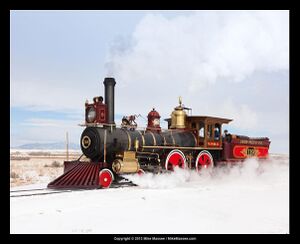Promontory locomotives: Difference between revisions
No edit summary |
|||
| Line 24: | Line 24: | ||
* [http://www.cprr.org/Museum/Replicas/index.html "Replica Jupiter and 119 Locomotives", <i>Central Pacific Railroad Photographic History Museum</i>] | * [http://www.cprr.org/Museum/Replicas/index.html "Replica Jupiter and 119 Locomotives", <i>Central Pacific Railroad Photographic History Museum</i>] | ||
* [https://www.youtube.com/watch?v=oM2A2NEaRqg "Building of the Jupiter and 119 Locomotives", <i>YouTube.com</i>] | * [https://www.youtube.com/watch?v=oM2A2NEaRqg "Building of the Jupiter and 119 Locomotives", <i>YouTube.com</i>] | ||
* [http://npshistory.com/publications/gosp/last-spike.pdf "The Last Spike is Drive", <i>National Golden Spike Centennial Commision</i> (PDF)] | |||
Latest revision as of 16:02, 9 March 2023
Promontory Summit, Utah is where the Golden Spike was driven in celebration of the completion of the First Transcontinental Railroad. Two locomotives are featured in the famous photo of the event: Central Pacific #60 (Jupiter) and Union Pacific #119.
In 1974, the National Park Service had approached O'Connor Engineering Laboratories of Costa Mesa, California, to construct exact, full-size replicas of the Jupiter and Union Pacific 119. As was the case with the engines themselves, no drawings or plans of the engines survived, necessitating entirely new drawings to be produced based mostly on photos of the engines as well as research done on similar engines built around the same time.
The replicas were completed in 1979, and began operations on May 10 of that year, 110 years after the original Golden Spike ceremony, and continue to make demonstration runs.
The drawings produced by O'Connor Engineering Laboratories are in the public domain, as they were produced with public funds. You can download a complete set of plans for both locomotives here:
- Promontory Locomotive Project, Sheets 1-281 (PDF)
- Promontory Locomotive Project, Sheets 282-786 (PDF)
Gallery
External Links
- Roy E. Appleman Report, July 1966
- "Everlasting Steam: The Story of Jupiter and No. 119" (PDF), National Park Service
- "Replica Jupiter and 119 Locomotives", Central Pacific Railroad Photographic History Museum
- "Building of the Jupiter and 119 Locomotives", YouTube.com
- "The Last Spike is Drive", National Golden Spike Centennial Commision (PDF)
